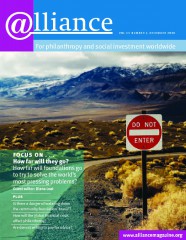The guest editor for this Alliance special feature is: Diana Leat.
How far are foundations willing to go to try to solve what they see as the most urgent problems facing the human race – whether it’s climate change or proliferation of nuclear arms or HIV/AIDS? This is the central question raised by this Alliance special feature.
While several articles focus on the reasons why foundations mostly don’t take on the biggest issues, others feature some of the few exceptions we found, including the India-based Khemka Foundation, the Canopus Foundation in Germany, the Mo Ibrahim Foundation in Africa, and the Rosenberg Foundation and the Brainerd Foundation in the USA.
The December issue of Alliance also includes an article by Laura Starita asking whether donors are willing to pay for advice; an article considering what sort of entities the Global Fund for Community Foundations should be supporting; and a selection of views, from editorial board members and others, on the implications of the global financial crisis on philanthropy and civil society.






